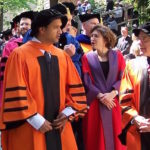The National Science Foundation recently changed the criteria for its Graduate Research Fellowship Program, one of the most prestigious federal funding awards for graduate students, to prioritize applicants in certain quantitative and technical fields like artificial intelligence. While the agency clarified that no applicants will be excluded based on their area of study, favoring certain topics signals that some research areas are more important than others and prioritizes research agendas over investment in future scientists.
We, like many other scientists, are concerned that this change may limit funding for promising scholars from underrepresented groups or undergraduate institutions with fewer resources — an outcome that would run counter to the goals of the American Innovation and Competitiveness Act of 2017, to enhance our nation’s innovation. We believe that federal agencies like the NSF should be expanding funding for graduate students rather than reprioritizing who receives it. Channeling more funding directly to a wide array of individual graduate students, particularly those from underrepresented groups, will help empower a diverse next generation of scientists.
Read the full article online at Inside Higher Ed.
This article was produced by Footnote in partnership with Emory University, University of Alabama, New York University, Duke University, and University of Michigan.





